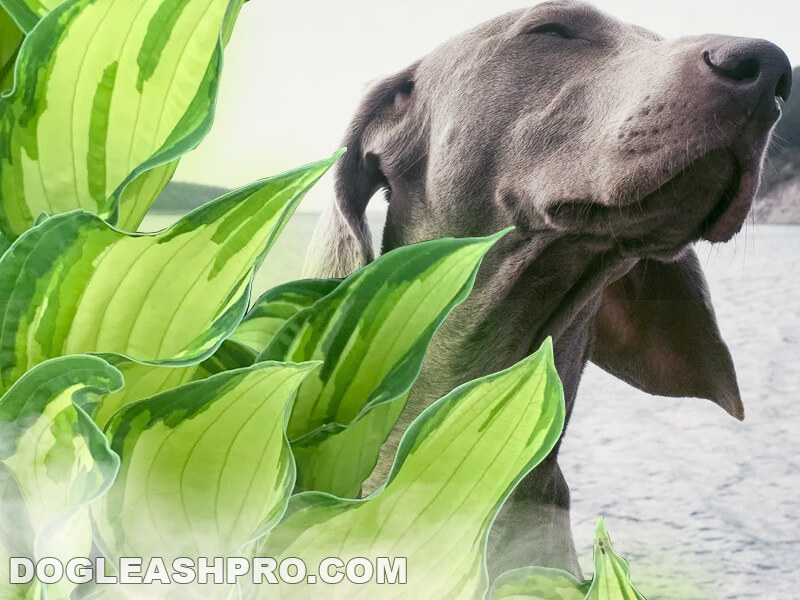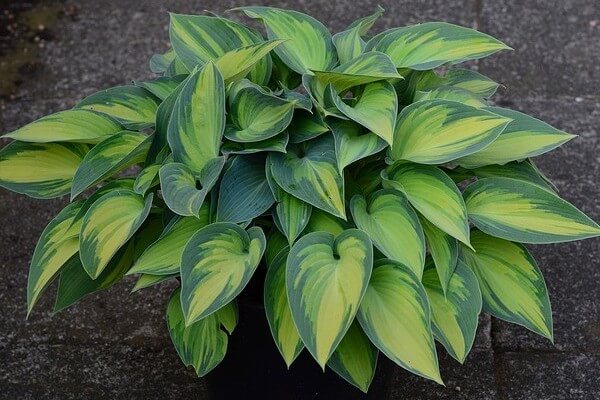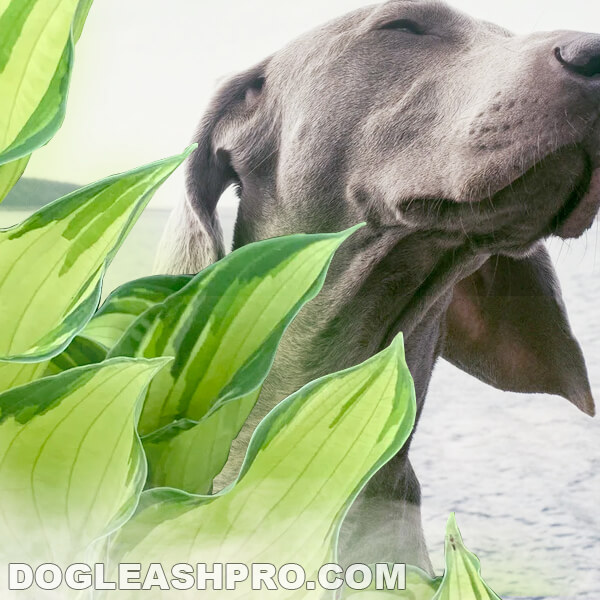
Hostas are beautiful plants that can be grown outdoor in your garden or they can be great houseplants. While Hosta plants do offer your backyard or home with tropical foliage in a variety of colors and sizes, dog owners need to think twice before planting and growing them.
Are Hostas poisonous to dogs? Yes, Hostas are poisonous to dogs because they contain a toxin called glycoside saponins that can cause severe reactions in dogs. If your dogs like to chew on anything and everything or you have Hostas in your home, please keep it on high surfaces or limit your dog’s access to this plant.
Table of Contents
Are Hosta plants poisonous to dogs?

Yes, Hosta plants are poisonous to dogs. To fully understand why Hostas are poisonous to our furry friends, let’s take a closer look at this plant.
What are Hostas?
Many people prefer to plant Hostas because they are low-maintenance plants that do not require much attention. The Hosta plants are beautiful and provide your backyard or home with a variety of colors, sizes, and foliage. Hostas are perennials that can survive under shaded conditions, which makes them shade tolerant. They only require a few hours of direct sunlight in the morning and can grow very fast.
The Hostas plant and your dog actually share one thing in common: they both like to be in a shaded area, especially on a hot summer day. While your pooch is laying in the shaded area of your garden to cool off, guess what plant may be there to accompany him? The Hostas plant!
If your dog feels a bit bored and wants to entertain himself, he can reach over to the Hostas with his head and sniff this plant. Now, we know dogs like to chew and eat what they see. While some dogs don’t have a taste for plants, others may actually start chewing them.
So how is Hosta plant poisonous to dogs?
Hosta plants are poisonous to dogs because they contain a toxic chemical that is harmful to dogs. This toxin is called glycoside saponins. Saponins actually got its name from the soapwort plant. This toxin can foam like soap.
So when our pooch eats the Hostas plants, the sugar-bonded molecules that make up the saponins start to separate and this causes foaming. The saponins foam up as they enter your dog’s digestive tract and paralyze it. As a result, the paralyzed digestive tract will cause twisting of the intestines. Scroll to the middle of the page for a list of symptoms of saponins toxicity.
While the human body has cholesterin that can inactive the saponins, our furry friend’s body does not have this ability to inactivate the saponins toxin. Even if your dog’s skin comes into contact with Hostas, the saponins toxin can cause pain, irritation, and discomfort in dogs.
Handy Hint: Lasagna contains 3 toxic ingredients that your dogs should avoid. Check out Can Dogs Eat Lasagna? to find out what these toxic ingredients are.
Are Hostas safe for dogs?
As you can see, Hostas are not safe for dogs. How bad the Hostas can affect your four-legged friends depends on 3 factors:
- The concentration of saponins in the Hostas plant.
- Size of your pups.
- How much of the Hostas your dog eats.
Thus, it’s crucial for dog owners to keep the Hostas plant away from their pups. This means planting potted Hostas and keeping the Hostas plant on high surfaces or hanging them from the ceiling so your furry friends can’t jump up and chew on them.
If you grow Hostas plants outside in your garden or backyard, create a physical fence around them to keep your pups away from the plant. The fence should be high enough so your pups can’t jump over it.
This is important because even if your canine friends did not ingest Hostas, just being in contact with the plant can also cause Hostas poisoning as well. When the plant comes into contact with your dog’s skin, he may start showing symptoms of saponin toxicity within a few minutes.
So whether your pooch comes into contact with the Hostas plants or ate some Hosta leaves, here are some immediate symptoms of Hostas poisoning to watch out for:
- Abdominal pain. Usually, your four-legged friend will experience this first. That’s because the Hostas plant just enters the stomach and the digestion of it as well as the toxic chemical can cause immediate abdominal pain.
- Bloating and twisting of the intestines. Your dog’s stomach and body may react to the toxin by becoming bloated and your pooch may feel the twisting of the intestines. Both of these symptoms can be extremely unpleasant for our K9 pals.
- Distress. All of these symptoms will cause distress to your furry friend.
- Loss of appetite. Consequently, due to the distress and depression, your K9 pal may lose his appetite.
- Vomiting and diarrhea can both be expected for dogs with Hostas poisoning.
Symptoms can also vary depending on how much Hostas your K9 pals have ingested. If your pooch consumes large amounts of Hostas, they may also experience the following:
- Abnormal heartbeat and heart rate.
- Nausea leading to vomiting.
If you notice your dogs are experiencing any of these signs and symptoms or you suspect your pups got into your Hostas plants, it’s best to call your vet right away. Immediate medical attention and intervention are required at this time.
Handy Hint: A dog’s vomit can be complicated. Sometimes dog owners may mistaken regurgitation or coughing for vomiting. Check out Dog Vomit Color Guide to find out whether your dog is actually vomiting or is it something else.
Treatment for dog eating Hosta
In order to properly treat your dog for saponin toxicity or Hostas poisoning, your vet may ask you to bring your furry friend into the office for a physical examination or check-up. The vet may also ask you to bring in a small sample of the Hostas plants that your pup ingested. This will allow the veterinary professional to properly diagnose your pooch.
First, there will be blood tests. Then, your vet will need to take urine samples. Your pup’s urine will allow the vet to analyze it and detect any poisoning. The vet may also check your canine friend’s mouth area as well as skin for any irritation from the sticky and milky sap.
Your dog’s vet may force your pooch to vomit and decontaminate with a mild cleanser by administering a hydrogen peroxide 3-percent solution. If your dog is dehydrated from either vomiting or diarrhea, the vet will administer IV (intravenous) fluids to keep your dog’s body hydrated and rebalanced. Your pup may be required to stay overnight at the veterinary hospital. He will start to recover and feel better again within a few hours and your vet will continue to monitor his major systems before allowing you to bring him home.
If you don’t have the ability to bring your canine friend to the vet’s office, the best next step is to bring him to your nearest emergency hospital. There’s a reason for this. While you can definitely administer the hydrogen peroxide by yourself, if you’re not experienced in administering it, there’s a high chance that you could administer the wrong amount and you may overdo it.
Be sure to call your vet for advice and proper instruction if you plan to administer the hydrogen peroxide to your pooch at home.
Luckily, it’s rare for Hostas poisoning to be very severe. Symptoms are usually mild and your pooch should recover nicely after proper treatment.
Are Hostas dangerous to dogs?

Since Hostas are dangerous to dogs, many veterinarians will recommend that pet owners remove the Hostas plants in order to prevent dogs from accessing them. By getting rid of the Hostas plant, it can help to prevent the incidence of Hostas poisoning or saponin poisoning.
Some vets may also suggest using a repellant and spraying it on the Hostas to keep dogs away from the plant.
We highly recommend that you fill a squirt bottle with water and some lemon juice. This mixture should be a ratio of 3 to 1. So there should be more water than lemon juice. Feel free to shake the squirt bottle before spraying the Hostas plant with this mixture. This trick should keep your dog from chewing the plant or coming into contact with it.
Can dogs eat Hostas?
No, dogs should not eat Hostas. While Hostas are not the most harmful plants that your dogs could sink their teeth into, consuming this plant could still cause severe reactions and poisoning.
Can dogs eat Hosta leaves? No, dogs should not eat Hosta leaves. Keep the Hostas plant inside the pots and place them on high surfaces or hang them from the ceiling to prevent your dogs from easily accessing them and chewing on the Hosta leaves.
Can dogs eat Hosta flowers? No, dogs should not eat Hosta flowers. Any and all parts of the Hostas plants are poisonous to dogs. If your four-legged friends ingest Hosta flowers or any part of the Hostas plant, be sure to call your vet right away. Your pooch may vomit right after eating the Hostas, which is normal.
However, dog owners should never induce vomiting in their canines if they see any of the following signs:
- Already vomiting.
- Feeling very lethargic.
- Not responsive.
- Difficulty swallowing and breathing.
- Having seizures.
- Being hyperactive.
- Had a recent abdominal surgery.
- Swallowed any sharp or foreign objects.
Again, it’s always best to contact your vet immediately and take your pooch to the veterinary hospital right away. Your dog’s vet will know how to help your dog in this type of situation.
Handy Hint: When it comes to plants, fruits, and vegetables, it’s always best to double-check that they are not toxic or poisonous to dogs. Many pet owners are confused about whether they can feed their furry friends plums. Check out Can Dogs Eat Plums? to find out if Plums are safe for doggy consumption.
Are Hostas toxic to dogs?
Since Hostas are toxic to dogs, dog owners should take extra precautions if they grow Hostas plants in their garden or inside the house. When dogs consume even a little bit of Hostas, they are at risk of saponins toxicity or hostas poisoning.
Because of this, pet owners should keep Hostas out of their dog’s reach, whether that be putting the Hostas plant on a high surface or putting up a fence around the plant. If your pups accidentally ate a little bit of the Hostas, make sure to contact your vet right away. This requires immediate medical attention.
Whether you decide to keep your Hostas plants or get rid of them, we hope this article provided you with key insights and everything you need to know about Hostas and dogs.
DISCLAIMER: THIS WEBSITE DOES NOT PROVIDE MEDICAL ADVICE
The information, including but not limited to, text, graphics, images and other material contained on this website are for informational purposes only. No material on this site is intended to be a substitute for professional veterinary advice, diagnosis, or treatment. Always seek the advice of your veterinarian or other qualified health care provider with any questions you may have regarding a medical condition.
Resources:
https://en.wikipedia.org/wiki/Hosta
https://www.merckvetmanual.com/toxicology/poisonous-plants/houseplants-and-ornamentals

With over five years of specialized experience as an animal writer, my expertise lies in dog nutrition, health, behavior, grooming, and training. I am dedicated to delivering helpful and informative content that caters to the well-being of our furry friends. My primary goal is to empower pet owners with knowledge and ensure our canine companions thrive in health and happiness. In my free time, I love volunteering at local dog rescue centers.







